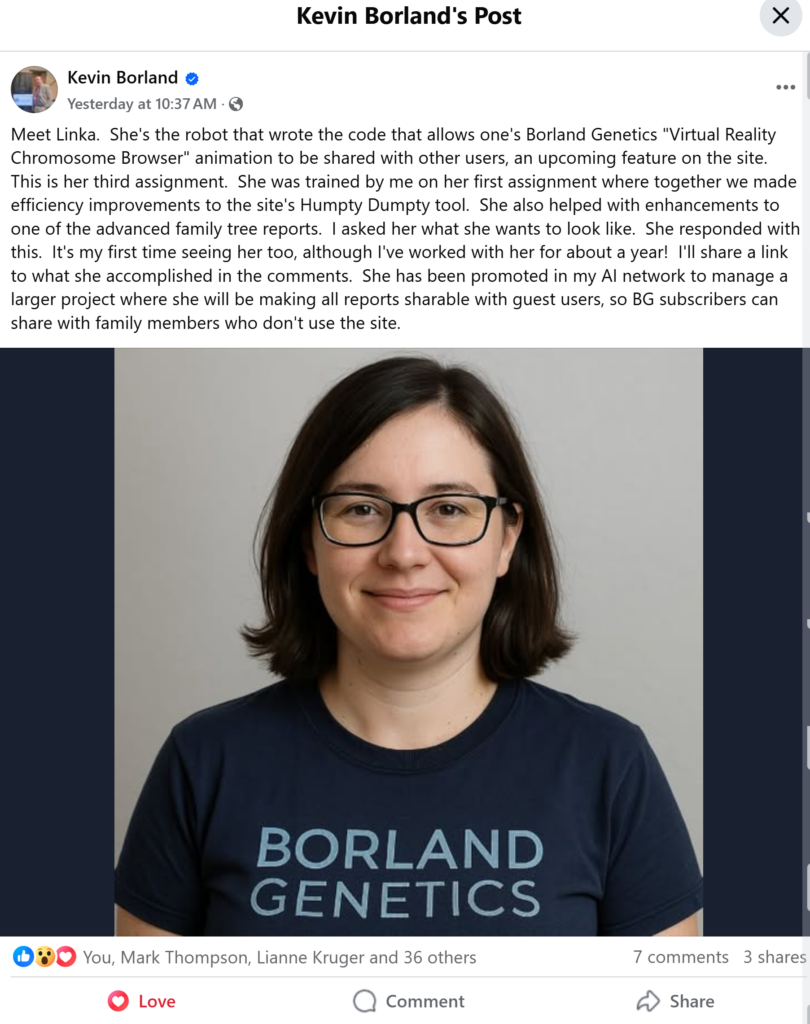About 14 months ago, I suggested genealogists would soon have a “flock of bots” assisting them. Borland Genetics is already making this a reality and even surpassing my expectations. Kevin Borland is creating at the cutting edge, orchestrating multiple AI assistants like a symphony conductor, pushing the boundaries of what’s possible. Yesterday, Kevin introduced Linka, an AI assistant he trained. Linka writes code to improve features on his genealogy site, Borland Genetics, making it easier for users to share their family history with relatives who aren’t members of the site.
But here’s what’s truly exciting: ALL genealogists can start creating their own helpful assistants, even at a basic level. Andrew Redfern’s upcoming webinar on saved prompts is a perfect example of how accessible this technology has become. Saved prompts are a basic AI skill that saves time by allowing users to re-use elaborate or simple prompts developed over time, with digital resources where you need them, for when you need them. The products have different names at different venders: Custom GPTs at OpenAI, Projects at Anthropic, and Gems at Google’s Gemini. While our creations may not initially match the sophistication of Kevin’s Linka, these assistants can still be amazingly useful and time-saving. And the pace of computational advancement is only accelerating—the next couple of years could be dizzying.
Saved prompts are a basic AI skill that saves time by allowing users to re-use elaborate or simple prompts developed over time, with digital resources where you need them, for when you need them.
AI Genealogy Insights
It’s exhilarating to witness this explosion of new tools created by everyday family historians alongside industry leaders. Technology like this is genuinely leveling the playing field, opening possibilities that once felt like science fiction. (I planned to share this post yesterday, when Kevin announced Linka, but held off to avoid it being mistaken for an April Fool’s Day prank—even though it sounds like science fiction, this is real.)
If you’re intrigued, don’t miss Andrew’s session at the “GPTs for Family History: Unlocking the Potential of AI” webinar during the 6th Annual 24-Hour Genealogy Webinar Marathon hosted by FamilyTreeWebinars.com and MyHeritage. The marathon begins Thursday, April 3 at 5pm Eastern U.S. time (Friday, April 4 at 8am Sydney time). Andrew’s webinar begins Thursday, April 3 at 8pm EDT.

This week marks the one-week anniversary of OpenAI’s improved image generator, GPT-4o with image generation. I’m guessing that the image of Linka that Kevin shared was generated by GPT-4o. This advance in image generation is marked by three characteristics: a leap in photorealism, almost perfect in-image text rendering (meaning it’s much better at incorporating words into images), and the ability to understand and implement long instructions in the image prompt. These new abilities are a manifestation of the new auto regressive image generation.
Sources:
Andrew’s webinar on saved prompts: https://familytreewebinars.com/webinar/gpts-for-family-history-unlocking-the-potential-of-ai/ https://familytreewebinars.com/24-marathon/
Borland Genetics: https://www.borlandgenetics.com/
Kevin Borland’s original introduction of Linka: https://www.facebook.com/kevin.borland.18/posts/pfbid0onRjUWSG91cM8NrhFFXjtsrVTj1ZzQYkSssWT6xiSjL5zZWSH2YaJT5X1fezg6wpl
“Linka” entry at International Society of Genetic Genealogy: https://isogg.org/wiki/Linka